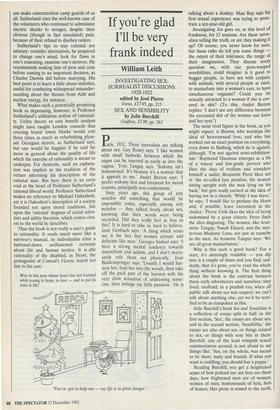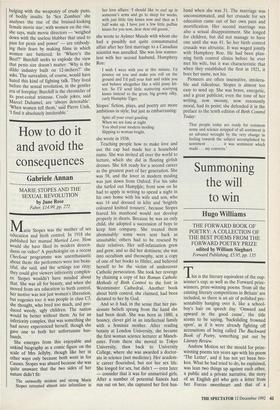If you're glad I'll be very frank indeed
William Leith
INVESTIGATING SEX: SURREALIST DISCUSSIONS 1928-1932 edited by Jose Pierre Verso, L17.95, pp. 215 SEX AND SENSIBILITY by Julie Burchill Grafton, £5.99, pp. 263 Paris, 1932. Three surrealists are talking about sex. Guy Rosey says: 'I like women with small buttocks between which the organ can be inserted as easily as into the vagina.' Yves Tanguy says: 'Sodomy isn't homosexual. It's because it's a woman that it appeals to me.' Andre Breton says: 'I prefer sodomy first and foremost for moral reasons, principally non-conformism.'
Sixty years ago, this group of arty weirdos did something that would be impossible today, especially among arty weirdos — they talked freely about sex, knowing that their words were being recorded. Did they really feel as free as this? It is hard to take in, hard to believe. Jean Genbach says: 'A thing which vexes me is the fact that women urinate and defecate like men.' Georges Sadoul says: 'I have a strong mental tendency towards masochism and sadism, and I don't neces- sarily rule them out physically.' Jean Baldenspringer says: 'Usually I would har- ness her, lead her into the woods, then take off the pack part of the harness with the very clear sensation of undressing some- one, then indulge my little passions.' He is `You've got to help me — my life is in great danger.' talking about a donkey. Man Ray says his first sexual experience was trying to pene- trate a ten-year-old girl. Investigating Sex goes on, at this level of frankness, for 12 sessions. Are these surre- alists telling the truth, or are they making it up? Of course, you never know for sure, but these talks do tell you some things the extent of their tolerance, the range of their imagination. They discuss every question we, with our porn-warped sensibilities, could imagine: is it good to bugger people, to have sex with corpses, with animals, with several people at once, to masturbate into a woman's ears, to have simultaneous orgasms? Could you be sexually attracted to a woman if she is cov- ered in shit? (To this, Andre Breton replies: 'I don't see any difference between the encrusted shit of the woman one loves and her eyes.') The most vivid figure in the book, as you might expect, is Breton, who worships the ideal of heterosexual love, and who has worked out an exact position on everything, even down to flashing, which he is against, although, 'I'm not against semi-exhibition- ism.' Raymond Queneau emerges as a bit of a voyeur and low-grade pervert who likes the idea of troilism and considers himself a sadist; Benjamin Peret likes sex in 'the so-called lazy position, the woman sitting upright with the man lying on his back,' but gets really excited at the idea of having sex in a church. 'While I was there,' he says, 'I would like to profane the Hosts and, if possible, leave excrement in the chalice.' Pierre Unik likes the idea of being sodomised by a giant clitoris; Peret finds the idea disgusting. The women, like Jean- nette Tanguy, Nusch Eluard, and the mys- terious Madame Lena, are just as raunchy as the men. As Jeanette Tanguy says: 'We are all great masturbators.'
Why is this such a good book? For a start, it's amazingly readable — you dip into it a couple of times and you find, sud- denly, that it's gone, you've read the whole thing without knowing it. The best thing about the book is the contrast between these early adventurers and ourselves: they lived, unafraid, in a prudish era, when all public talk about sex was suspect; we can't talk about anything else, yet we'd be terri- fied to be as outspoken as this.
Julie Burchill's book Sex and Sensibility is a collection of essays split in half: in the first section, 'Sex', the essays are about sex, and in the second section, 'Sensibility,' the essays are also about sex, or things related to sex, or things with sexy bits in them. Burchill, one of the least wimpish sexual commentators around, is not afraid to say things like: 'Sex, on the whole, was meant to be short, nasty and brutish. If what you want is cuddling, you should buy a puppy.' Reading Burchill, you get a heightened sense of how policed our sex lives are these days, how frightened men are of women, women of men, homosexuals of hets, hets of homos. Her prose is armed to the teeth, bulging with the weaponry of crude puns, of bodily insults. In 'Sex Zombies' she analyses the rise of the bruised-looking female movie star; with women on the rise, she says, male movie directors — 'weighed down with the useless blubber that used to pass for penis and power' — are embody- ing their fears by making films in which women are battered. In `Where's the Beef?' Burchill seeks to explode the view that penis size doesn't matter: 'Why is the dildo industry built on 12-inchers?' she asks. The surrealists, of course, would have hated this kind of fighting talk. They lived before the sexual revolution, in the gentler era of foreplay; Burchill is the chronicler of its post-coital tristesse. Crude jokes, said Marcel Duhamel, are 'always detestable'. `When women tell them,' said Pierre Unik, `I find it absolutely intolerable.'



































































 Previous page
Previous page